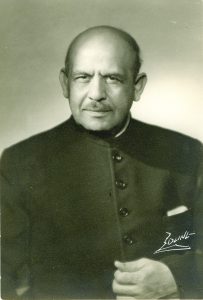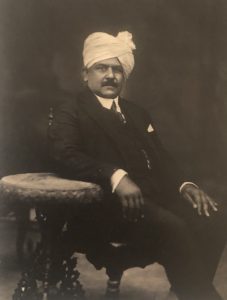Pir-o-Murshid Jagirdar Muhammad Ali khan Thopezai
Baroda 7 VII 1881 – The Hague, 29 IX 1958
 Muhammad Ali khan, second cousin hence “cousin brother” to Hazrat Inayat and Mir Maheboob khans was the third, eldest but longest-living member of what became known as the “1910 Sufi Triumvirate”. He succeeded Maheboob khan as leader of Hazrat Inayat khan’s Sufism, from 1948 until 1958.
Muhammad Ali khan, second cousin hence “cousin brother” to Hazrat Inayat and Mir Maheboob khans was the third, eldest but longest-living member of what became known as the “1910 Sufi Triumvirate”. He succeeded Maheboob khan as leader of Hazrat Inayat khan’s Sufism, from 1948 until 1958.
Born at the same Maulabakhsh Haveli at Baroda, when orphaned in infancy his maternal grandparents took him to Tonk State in Rajasthan, adopting him as their heir. The grandfather had fought in the “Indian Mutiny” in 1857/58, then escaped to Tonk, where the ruling Nawab installed him as a Jagirdar, feudal landholder. And where, the orthodox Muslim Ahmad khan, adopted “Thopezai” as new clan name in memory of his Hindu commander in the Gwalior battles, Tatya Thope. Being a feudal jagirdar’s heir (the Baroda family mainly being allodial zamindars – a distiction like squirearchy and landed gentry) already involved young Md. Ali khan in obligations like court attendance in full armour and review rides through their lands. Early experience thus provided points of departure for fertile adult expansion in lifelong characteristics such as a spontaneous ease in the most varied social relations, alongside a patriarchal self-assurance and authority. As well as an immense generosity and mindfulness. Easily moved to tears when his heart was touched, he had unusual self-control with no trace of agitation or excitement, let alone of anger or despondency. Md. Ali khan’s devotion and loyalty towards his admired younger cousin – brothers Inayat and Maheboob khans, was boundless, a feeling fully reciprocated by them as well, fondly addressing him as “Mullah”, religious guide. Their father, Mashaik Rahmatullah khan, also had already said: “Ali khan is my son as well”.
 Training in European voice cultivation, by the nineteen-twenties he became celebrated as Ali khan “with the golden voice and the golden heart”. He also was the only one among the brothers, who without Hazrat’s genius and his Indian Sufism, could have gained a rousing personal success from any stay on his own in the alien West. In reality, it became natural to him to submit all his talents and potential to the support and accompaniment of his brothers with complete self-abnegation. That to him was so utterly normal that he could never understand that so many people were lacking in such a self-evident attitude. This was one thing that could raise consistent commitment and veritable indignation in him.
Training in European voice cultivation, by the nineteen-twenties he became celebrated as Ali khan “with the golden voice and the golden heart”. He also was the only one among the brothers, who without Hazrat’s genius and his Indian Sufism, could have gained a rousing personal success from any stay on his own in the alien West. In reality, it became natural to him to submit all his talents and potential to the support and accompaniment of his brothers with complete self-abnegation. That to him was so utterly normal that he could never understand that so many people were lacking in such a self-evident attitude. This was one thing that could raise consistent commitment and veritable indignation in him.
Md. Ali khan was also an enthusiast in whatever he took up in both outer and inner life. (Characteristically, only his book case contained grammars of Italian, Spanish, French, Russian, German and Dutch). He came to stand out in three directions: like Inayat and Maheboob khans, he was a mystic of unfathomable depth and shining radiance.
His distinctive qualities were first, being a spiritual healer, become famous well beyond Sufi circles. For that rare talent he had been trained and authorised at Baroda, but the intensity of his meditative life and deep religious faith along with his caring attitude to all, gave his healings extraordinary force and effectiveness. And then, with his splendid voice he became the masterful interpreter of Maheboob khan’s song compositions.
The unique combination of Hazrat Inayat khan’s poetic texts with Mir Maheboob khan’s striking compositions then sung by Murshid Ali khan for decades became an artistic, aesthetic and spiritual delight and rich inspiration for all those fortunate enough to attend such occasions, begun during the three-monthly Summerschools in France and then spread lifelong in Sufi centres and concert sessions wherever Md.Ali khan went.
The “1910 Sufi Triumvirate” in their threefold musical excellence found one of its happiest testimonies and expressions in a music both Indian and European, and thus potentially to be revived in each generation!
